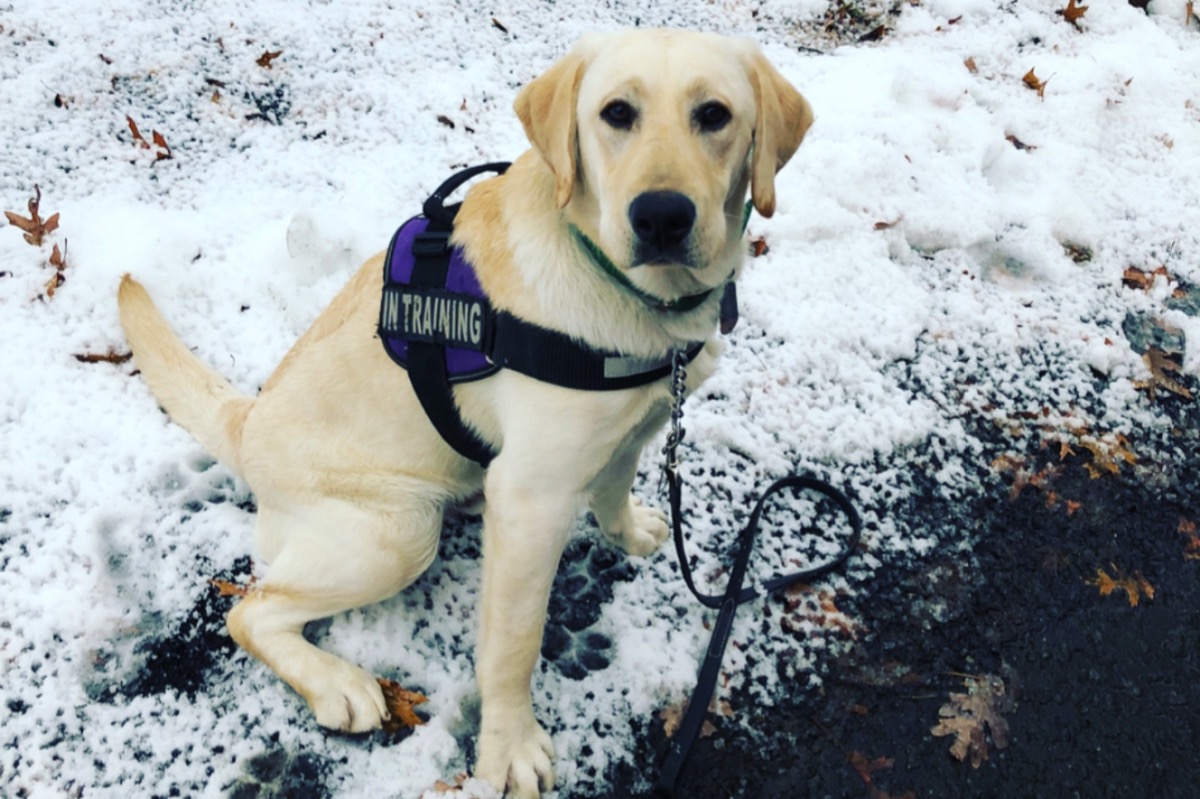
Leo the Psychiatric Service Dog Fundraiser
Donation protected
Hello! It’s me, Jamie. I’d like to say I’m your average 27-year-old crazy cat lady but nothing in my life is average. Most of you probably know me as “The Human” from “Toes The Cat” on Facebook. Some of you may know me through “real life”. And some of you may not know me at all. Yet here I am, spilling my guts hoping for your support and I won’t lie… I’m nervous.
I have truly struggled with mental health problems for years and more specifically since I was a young teenager. Not long after I adopted Toes, I really started to struggle more with mental health issues. I have detailed specific diagnoses leading to unfortunate side affects of certain disabilities. I also have a heart condition, which I shared a little about that went undiagnosed until about two years ago. But thanks to an amazing cardiologist, I am now on medication (expensive medication that insurance won’t cover) that keeps my heart under control. A few years ago I started struggling with a neurological issue, which is still being diagnosed. With the neurological issues combined with my mental health, I’ve struggled with living a ‘normal’ life including being out of work. I’ve tried every type of therapy from medicine to holistic to allopathic, common and uncommon, but all with no success.
Recently, I met a woman named Courtney who owns Seacoast Labradors. Courtney breeds, raises, and trains dogs to be both emotional support animals and service dogs. She found a nine-month-old yellow lab named Leo who was hand picked from his litter to be a service dog that she thought would completely change my life and will be fully trained as my service dog. The ADA explains it best, “Service animals are defined as dogs that are individually trained to do work or perform tasks for people with disabilities. Examples of such work or tasks include guiding people who are blind, alerting people who are deaf, pulling a wheelchair, alerting and protecting a person who is having a seizure, reminding a person with mental illness to take prescribed medications, calming a person with Post Traumatic Stress Disorder (PTSD) during an anxiety attack, or performing other duties. Service animals are working animals, not pets. The work or task a dog has been trained to provide must be directly related to the person’s disability. Dogs whose sole function is to provide comfort or emotional support do not qualify as service animals under the ADA.”Leo is going to spend about six more months training with her to learn how to mitigate my disabilities and help me live a more normal life. He is going to be scent trained based off the cortisol levels that my specific body gives off. He will know when I am in need and will be task trained to help me avoid or get through a situation.
As you can imagine, to get a service dog does not mean getting something free. While there are organizations that sometimes give people service dogs at no cost the wait list to get a dog from these organizations is often years long. I will be paying out of pocket for Leo and need some help. Leo’s flight from California to Massachusetts, food and boarding while with his trainer, training sessions, gear, and more cost a pretty penny. Every dime raised through this GoFundMe is going straight into my “Leo the Lab Service Dog Fund” and every penny raised is going straight towards him. If you are unable to financially donate, please consider sharing this story with your friends and keep me in your thoughts.
Want to know more about service dogs? The American with Disabilities Act has a lot of great information on service dogs: “Under the ADA, a service animal is defined as a dog that has been individually trained to do work or perform tasks for an individual with a disability. The task(s) performed by the dog must be directly related to the person's disability. The dog must be trained to take a specific action when needed to assist the person with a disability. For example, a person with diabetes may have a dog that is trained to alert him when his blood sugar reaches high or low levels. A person with depression may have a dog that is trained to remind her to take her medication. Or, a person who has epilepsy may have a dog that is trained to detect the onset of a seizure and then help the person remain safe during the seizure.” Click here for more: https://www.ada.gov/regs2010/service_animal_qa.html



I have truly struggled with mental health problems for years and more specifically since I was a young teenager. Not long after I adopted Toes, I really started to struggle more with mental health issues. I have detailed specific diagnoses leading to unfortunate side affects of certain disabilities. I also have a heart condition, which I shared a little about that went undiagnosed until about two years ago. But thanks to an amazing cardiologist, I am now on medication (expensive medication that insurance won’t cover) that keeps my heart under control. A few years ago I started struggling with a neurological issue, which is still being diagnosed. With the neurological issues combined with my mental health, I’ve struggled with living a ‘normal’ life including being out of work. I’ve tried every type of therapy from medicine to holistic to allopathic, common and uncommon, but all with no success.
Recently, I met a woman named Courtney who owns Seacoast Labradors. Courtney breeds, raises, and trains dogs to be both emotional support animals and service dogs. She found a nine-month-old yellow lab named Leo who was hand picked from his litter to be a service dog that she thought would completely change my life and will be fully trained as my service dog. The ADA explains it best, “Service animals are defined as dogs that are individually trained to do work or perform tasks for people with disabilities. Examples of such work or tasks include guiding people who are blind, alerting people who are deaf, pulling a wheelchair, alerting and protecting a person who is having a seizure, reminding a person with mental illness to take prescribed medications, calming a person with Post Traumatic Stress Disorder (PTSD) during an anxiety attack, or performing other duties. Service animals are working animals, not pets. The work or task a dog has been trained to provide must be directly related to the person’s disability. Dogs whose sole function is to provide comfort or emotional support do not qualify as service animals under the ADA.”Leo is going to spend about six more months training with her to learn how to mitigate my disabilities and help me live a more normal life. He is going to be scent trained based off the cortisol levels that my specific body gives off. He will know when I am in need and will be task trained to help me avoid or get through a situation.
As you can imagine, to get a service dog does not mean getting something free. While there are organizations that sometimes give people service dogs at no cost the wait list to get a dog from these organizations is often years long. I will be paying out of pocket for Leo and need some help. Leo’s flight from California to Massachusetts, food and boarding while with his trainer, training sessions, gear, and more cost a pretty penny. Every dime raised through this GoFundMe is going straight into my “Leo the Lab Service Dog Fund” and every penny raised is going straight towards him. If you are unable to financially donate, please consider sharing this story with your friends and keep me in your thoughts.
Want to know more about service dogs? The American with Disabilities Act has a lot of great information on service dogs: “Under the ADA, a service animal is defined as a dog that has been individually trained to do work or perform tasks for an individual with a disability. The task(s) performed by the dog must be directly related to the person's disability. The dog must be trained to take a specific action when needed to assist the person with a disability. For example, a person with diabetes may have a dog that is trained to alert him when his blood sugar reaches high or low levels. A person with depression may have a dog that is trained to remind her to take her medication. Or, a person who has epilepsy may have a dog that is trained to detect the onset of a seizure and then help the person remain safe during the seizure.” Click here for more: https://www.ada.gov/regs2010/service_animal_qa.html



Organizer
Jamie Strazzero
Organizer
Newburyport, MA